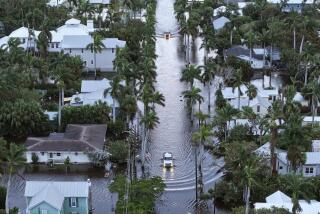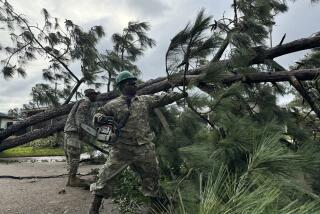Isaac leaves hundreds of homes underwater; dam shows stress
NEW ORLEANS — After three days of mayhem, a weakened Isaac edged northward out of Louisiana on Thursday, leaving a third of the state without power, more than 60,000 residents evacuated and worried officials preparing to release water from a storm-stressed dam near the Mississippi border. At least one death was reported.
Hundreds of homes remained underwater, and nearly 5,900 weary residents in Louisiana and more than 1,800 in Mississippi scrambled to makeshift shelters. At least 500 people who had gambled on riding out the storm were rescued by helicopter or boat, as Isaac was downgraded late Thursday to a tropical depression — a far cry from its 80-mph winds at landfall.
Although levees protecting New Orleans held, officials warned that the danger wasn’t over. Mayor Mitch Landrieu lifted a dusk-to-dawn curfew but implored residents not to leave their homes on irresponsible sightseeing trips.
“We’ve got people going block by block to assess water levels, but this storm has merely entered a different phase,” he said. “It’s still dangerous. The game is not over until it’s over.”
President Obama has declared both Louisiana and Mississippi disaster areas, clearing the way for federal aid.
Even as the rains and winds lessened, rural and suburban areas remained firmly in Isaac’s watery grip. Rivers across Louisiana continued to rise and many were predicted to reach historic flood levels of 20 feet or more. In some places, entire communities were evacuated, including Kentwood, La., population 2,200.
In a region used to nature’s wrath, survivors of storms with names like Gustav, Ike and Katrina kept one eye on the sky and the other on rising waters. Downed trees and power lines continued to block roadways, and cars and trucks plunged headlong into standing water.
In storm-thrashed Plaquemines Parish, officials began work on a levee breach to prevent the structure’s failure. A long line of cars snaked down the Belle Chasse highway to the one open gas station.
After three days, many residents said Isaac, like lingering houseguests, had worn out its welcome.
“This is worse than Katrina,” David Guys said as he waited in line to enter one of the few open shops in downtown New Orleans. “Katrina came through, did her damage and was gone.”
Guys said all the food in his refrigerator had spoiled and he needed to get something to feed his five children. But he’d have to wait: The store’s owner, wary of looters, was letting in only a handful of people at a time and had put a sign in the door reading, “We are inside and armed.”
But the day’s most tense drama occurred 60 miles northwest of New Orleans, where Lake Tangipahoa Dam, just across the Mississippi border, showed signs of weakening.
Officials ordered 60,000 residents within half a mile of either side of the swelling Tangipahoa River to evacuate, and crews with backhoes, bulldozers, pumps and other equipment rushed to the 2,300-foot-long earthen dam at Percy Quin State Park. As workers prepared for a “controlled breach,” a Louisiana National Guard helicopter hovered overhead, providing a minute-by-minute update of the dam’s condition.
“Even if they declare the operation a success, I would still stay evacuated because if there is a breach, we do not want people evacuating in the middle of the night,” Louisiana Gov. Bobby Jindal said in the afternoon. “Go ahead and get out now before the water comes — that’s a lot better than having to be rescued.”
Mississippi Gov. Phil Bryant sounded a similarly ominous tone. “It does just take a little breach to be a big problem for all of us because that water would get down south quick,” he said before leaving to inspect the dam.
By 8 p.m., workers were about to begin the controlled release of water, the Mississippi Emergency Management Agency said.
More than 610,000 people remained without power in Louisiana and nearly 89,000 in Mississippi. But Louis Armstrong New Orleans International Airport had regained electricity and planned to reopen Friday, just in time for a lavish gay event in the French Quarter this weekend.
One death had been reported. A 62-year-old tow truck driver was killed when a tree fell on his truck in Picayune, Miss., said Tony Bounds, spokesman for Pearl River County’s emergency operations center.
As the brunt of Isaac’s violence moved into Arkansas, New Orleans breathed a collective sigh of relief.
But in rural areas, storm waters defied the sandbags, flooding into homes and engulfing roadside mailboxes. At one flooded and abandoned home, two cows stood forlornly on a front porch surrounded by water, like castaways marooned at sea.
molly.hennessy-fiske@latimes.com
Susman reported from Louisiana, Hennessy-Fiske from Los Angeles and Glionna from Nevada. Times staff writer Matthew Teague in Mississippi contributed to this report.
More to Read
Sign up for Essential California
The most important California stories and recommendations in your inbox every morning.
You may occasionally receive promotional content from the Los Angeles Times.













